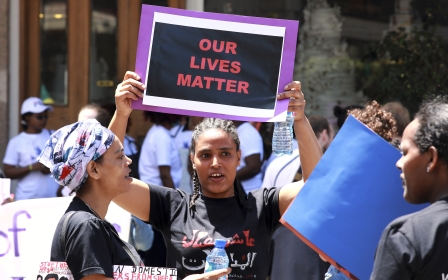Blacklisted Lebanese boss prevents abused domestic worker from returning to Nigeria

An abused Nigerian domestic worker in Lebanon was prevented from boarding a repatriation flight home after her blacklisted employer intervened, anti-trafficking activists have said.
Fifty trafficked Nigerian women arrived home from Lebanon on Sunday, along with 19 nationals who have been stranded in the country because of Covid-19 travel restrictions, Nigeria’s foreign minister said at the weekend.
But activists have told MEE that eight women were prevented from boarding the flight, including Ariwolo Olamide Temitope, 31, whose bloodied image circulated on social media last month after an altercation with her employer.
MEE has learnt that another woman who was rescued by Nigerian authorities after being put up for sale on Facebook has chosen to stay in Lebanon for now.
New MEE newsletter: Jerusalem Dispatch
Sign up to get the latest insights and analysis on Israel-Palestine, alongside Turkey Unpacked and other MEE newsletters
Temitope told Al Jazeera last month that she had been set upon by her employer Mahmoud Zahran, who accused her of stealing a phone while she spoke to her family in Nigeria on 25 April.
After receiving a blow to her mouth, she took a video of herself.
"Help me. Oh lord. How long do I want to keep doing this? And I didn't take the phone. Look how they beat me! Look how they beat me!" she says during the film.
Temitope said that the family turned against her when she refused Zahran's advances shortly after arriving at their home in October 2019.
Zahran’s family has denied the claims, but the Lebanese authorities have banned him and his wife Feyzeh from hiring domestic workers and launched a criminal investigation into the allegations.
Temitope fled after the assault and contacted the Nigerian embassy, which arranged for her to leave on the emergency evacuation flight at the weekend.
An image posted on social media shows her at the airport pushing a luggage trolley, wearing a surgical mask and a New York Yankees baseball cap.
But activists at This is Lebanon, a coalition of former domestic workers in Lebanon that regularly names and shames abusers, said that shortly after the picture was taken they received a text message with devastating news.
"I was not allowed to enter [sic] plane to Nigeria. They said my madam did not approve me to leave Lebanon country."
Speaking to MEE, a spokesperson for the group said:
“Why is the family who assaulted her allowed to prevent her evacuation? It seems as though the family who was supposedly blacklisted from having another domestic worker owns the one they assaulted and can control her movements.”
Enebeli, a Nigerian anti-trafficking activist based in Lebanon, told MEE that when asked by immigration officials, the employers of Temitope and those of some of the other women had refused to give permission for them to leave and then further alleged that they had stolen from them.
The kafala system, widespread across Lebanon and parts of the Middle East, grants employers a large say over the fate of domestic workers who have few rights.
Enebeli, who did not want to give his full name, said he has not heard from Temitope since the weekend.
“We don’t know where she is right now. I’m worried for her, I’m seriously worried about it.”
Goni Zannabura, Nigeria’s ambassador to Lebanon, confirmed that some of the women failed to board the flight but said that he was “yet to know” the reasons why.
Thousands of Nigerians are lured away each year to work as domestic workers across the Middle East, with some suffering abuse.
Many have gone without pay for months, activists say, as Lebanon reels from a collapsing economy compounded by a coronavirus lockdown.
Last month, a Lebanese man was arrested and charged after putting a Nigerian domestic worker up for sale on Facebook for $1,000.
A source at the Nigerians in Diaspora Commission, which falls under the Ministry of Foreign Affairs, said on Tuesday that the woman, who was rescued after the attempted sale, chose not to board the weekend flight but was still in the care of consular authorities.
A spokesperson for the commission, which supports nationals abroad, told MEE last month that they were dealing with hundreds of cases of abuse of domestic workers across the Middle East, including in Lebanon, which they described as “very dangerous”.
“We’re dealing with sexual harassment and abuse, cases of men abusing them and wanting them not to tell their wives, death threats,” the spokesperson said.
The 50 trafficked women have been placed in quarantine and are set to be interviewed by the country's anti-trafficking agency about their experiences once their isolation ends.
Middle East Eye delivers independent and unrivalled coverage and analysis of the Middle East, North Africa and beyond. To learn more about republishing this content and the associated fees, please fill out this form. More about MEE can be found here.





